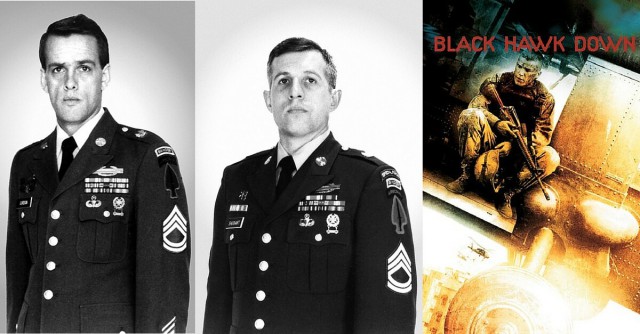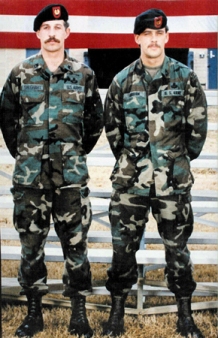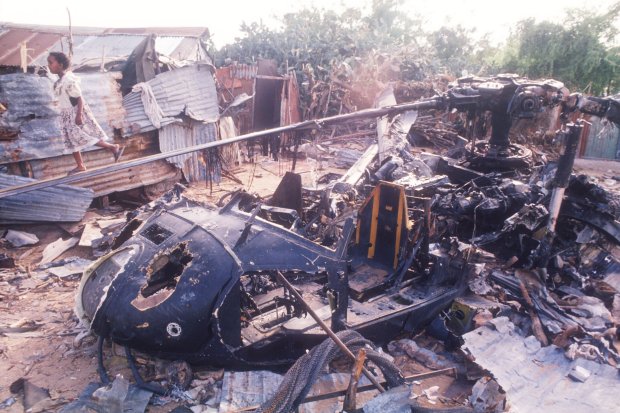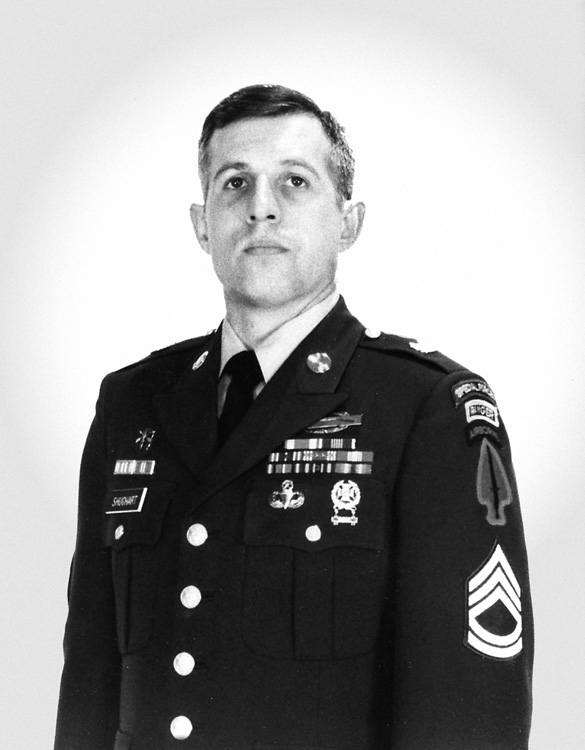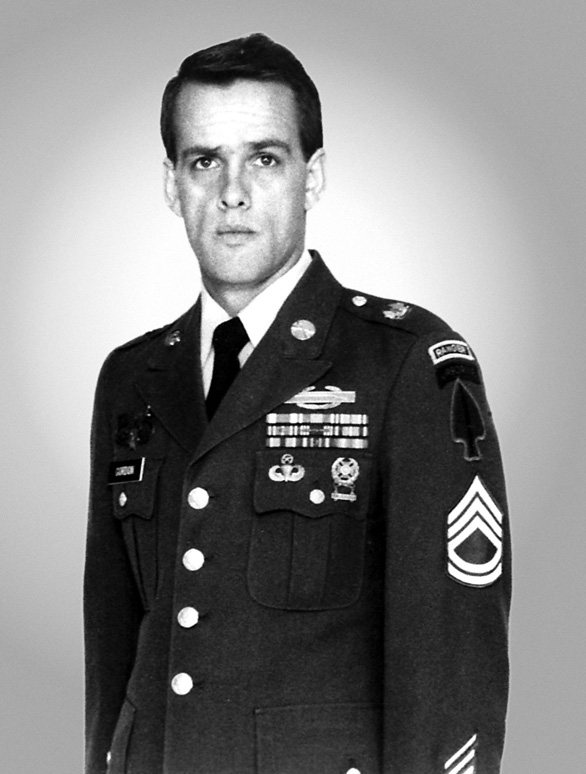The situation was grim on the afternoon of October 3rd, 1993. Things had been wrong from the beginning – what was supposed to have been a routine, thirty-minute raid to bust in and snatch the brutal Somali warlord Mohammed Farah Aidid from the confines of his Mogadishu hideout quickly devolved into a disaster. One Black Hawk helicopter had already been shot down – hit by a salvo of RPG fire, stranding teams of U.S. Army Rangers and Delta Force operatives on the ground deep inside enemy territory, surrounded by people actively trying to kill them.
The entire city had completely exploded into a full-blown warzone in the span of a little less than an hour, as men from Aidid’s militia rushed out from buildings across the city, armed to the teeth with assault rifles, pistols, rocket-propelled grenades, and whatever other nasty weaponry they could get their hands on. Nextm a second Black Hawk – one that had been sent in to provide assistance with this rapidly-degenerating situation – had also taken an RPG to the tail rotor and was now spewing black smoke as it crash-landed in a residential neighborhood dozens of blocks from the battle.
As Warrant Officer Michael Durant’s Black Hawk, code named Super Six-Four, smashed down in a cloud of dust and smoke, Master Sergeant Gary Gordon and Sergeant First Class Randy Shughart watched helplessly from the deck of their Black Hawk as it maneuvered over to the crash site. These elite Delta Force snipers had initially been assigned to provide precision air-to-ground fire support to the operation, but now with Super Six-Four sitting helplessly in the middle of enemy territory like a six-million-dollar sitting duck, its crew all either dead or critically wounded, the herculean task had suddenly fallen on them – and them alone – to provide covering fire and keep any surviving crew members alive until a ground team could arrive and secure the area.
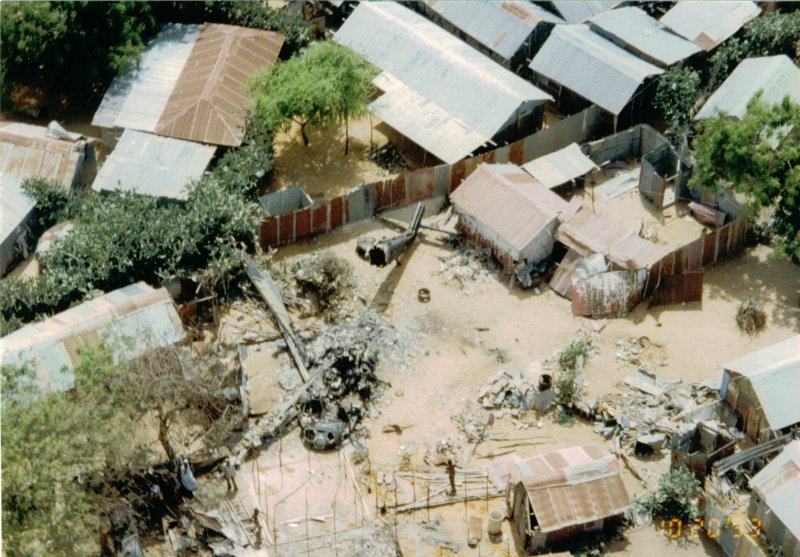
But the cavalry wasn’t coming any time soon. Gordon and Shughart knew that as they looked out across the burning cityscape of Mogadishu. They knew that fewer than a hundred Rangers and Delta operatives were currently pinned down on the other side of the city, fighting for their lives, surrounded by thousands of well-armed Somali militia troops with explosives and heavy machine guns. The U.S. convoy that had been sent to rescue the stranded soldiers had been hammered by RPG fire from city windows, and they weren’t making any progress through the maze of city streets that had been expertly blockaded by Aidid’s men. Super Six-Four was completely cut off, and now a growing mob of AK47-toting militia was sprinting down the streets of Mogadishu, making a beeline towards the smashed helicopter and her severely battered crew.
Looking down at the wreckage of the Black Hawk, watching helplessly as Warrant Officer Durant sitting there in the pilot’s chair of the crippled machine desperately fighting for his life, trying to pick off swarms of marauding militia men with an MP5 submachine gun set on single-shot fire, Delta Force sniper team leader Gary Gordon made the toughest call any man could possibly make.
“Without a doubt, I owe my life to these two men and their bravery.
Those guys came in when they had to know it was a losing battle.
There was nobody else left to back them up.
If they had not come in, I wouldn’t have survived.”
With the crowd rapidly closing in, and realizing that there was no chance for the downed pilot to survive the oncoming tidal wave of gunslinging humanity, Sergeant Gordon boldly requested to be placed on the ground so that he and Sergeant Shughart could set up a defensive perimeter and protect the downed helicopter and her crew. His request was denied. Twice. It was too dangerous but this was too much. He was volunteering for a suicide mission. Gandalf wasn’t going to ride in on a white horse and save the day with a blinding flash of light. They were going to be going in alone.
Gary Gordon and Randy Shughart couldn’t just sit there and do nothing while wounded Americans were down there fighting for their lives against impossible odds. On his third request, Gordon received permission to hit the ground and take the attack in.
The pilot of Gordon and Shughart’s Black Hawk first attempted to land right next to the crash site of Super Six-Four, but the LZ was too hot – a flood of small arms fire, RPGs, and an excess of ground debris and fire made insertion impossible. So instead of putting down in the middle of the action, Gordon and Shughart jumped from the hovering helicopter 100 meters from the crash site, getting boots on the ground just seconds before an RPG smashed into the Black Hawk, blowing the door gunner’s leg off and severely injuring many of the crew (the pilot of this Black Hawk ended up flying the bird home with a bullet in his shoulder and his co-pilot unconscious). The two Delta snipers moved quickly through the shanties of the neighborhood, fighting the enemy solely with their rifles and pistols. Before long, they’d fought through the streets to reach the clearing where the smoking hulk of Super Six-Four lay motionless.
They arrived just in time. Warrant Officer Durant was still strapped in the cockpit, running low on ammunition, his leg broken in several places and a couple of his vertebrae crushed but continuing to fight like a wildman. Three of the other crew members were in even worse shape, barely alive and in no condition to fight.
But Gordon and Shughart were the best of the best. Green Berets. Delta Force. Veterans of countless firefights and career soldiers who always remained cool no matter how ridiculously the odds were stacked against them. The two men rushed to the cockpit, checked on the pilot, and pulled him from the wreckage without further aggravating the man’s grievous injuries. They then moved him and the three wounded crew members back away from the wreckage, gave some ammunition to Durant and proceeded to set up the best perimeter they could muster, considering they were just two guys preparing to stand off against pretty much the entire city of Mogadishu with nothing more than a pair of assault rifles and pistols.
“Their actions were professional and deliberate to the point that they looked like they were planning a parking lot. They didn’t seem alarmed the situation that we were in. It was just focused on the task, doing what they needed to do to improve our situation, and get through it, get us rescued. Whatever it is they needed to do.”
“I never saw where they came from, but they had to come from the rear,
otherwise I would have seen them approach. It was a surreal feeling.
I mean it was like this awful situation that you just realized your in is now suddenly over.” ~ Michael Duran
The mob arrived. Gordon and Shughart knew they were just going to have to go Horde Mode against an armed militia and hope that there might be any possible chance that they could hold the attack off long enough for rescue to show up. But that wasn’t likely, and they knew it. These guys were the cavalry. The only thing standing between an angry throng of Somalis and four critically wounded Americans.
Militia troops swarmed in from every side, scrambling over the rubble, AK-47s spewing lead. Some of them just ran screaming out into the middle of the road, without any cover, desperately trying to reach the Americans and achieve glory in combat or die for the cause in the process (Gordon and Shughart helped them out with the latter). Ducking behind cover, popping and firing, the Delta snipers laid down a wall of death for anyone who came close, blasting away with burst-fire with their rifles and switching over to double-tap pistol fire when necessary, trying their damnedest to separate the armed militia targets from the innocent civilians on the street. Carrying only those two firearms, this pair of Delta operatives fought tenaciously, refusing to give up ground, defending at all costs, and surgically mowing down their foes while assault rifle rounds pinged off nearby debris and enemy troops chucked hand grenades at their positions.
“When you get in a situation like that, I think pretty much without exception, what I’ve heard described as a feeling of I’m not fighting for my country anymore, I’m not fighting for my paycheck, I’m not fighting for the flag, I’m fighting for the guy next to me. I’m fighting for my comrades. I’m gonna do whatever it takes so that we get out of this alive. And uh, I’ve heard that said before, and that, that’s what it boils down to.
I mean when I went back in there, I went back in there because I knew the Rangers on the ground needed our help. When Randy and Gary came into my crash site they knew the chances were pretty good they wouldn’t make it out alive, but they did it because they knew that if they didn’t take action, we were gonna die. And that’s why they did it. “
There’s some debate over who was killed in action first. The official military documents say it was Shughart. Durant is pretty sure it was Gordon. I would argue that it doesn’t really matter. These two men – Gary Gordon and Randy Shughart – are going to be inextricably linked together forever in the annals of American military history, and I’m completely confident that either of these men would have reacted the exact same way under fire. 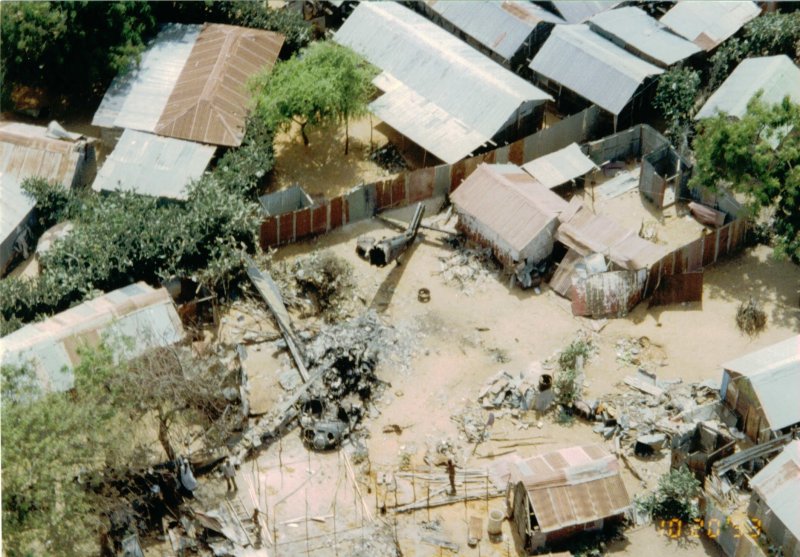
Whatever the case may be, one of the snipers was finally shot with a mortal wound. Durant recalls the operative’s last words as simply, “Damn, I’m hit,” said plainly in a matter-of-fact way that “sounded almost irritated”. The lone surviving Delta operator circled back around the nose of the Black Hawk, back into Durant’s field of vision, handed the wounded pilot an assault rifle, and asked if there was any extra ammo in the helicopter. Durant told him about the M-16s the crew chiefs kept between the seats, so the lone survivor rushed over, grabbed a handful of mags, and got on the radio to request a status report. He was told that reinforcements would be there “in a little while.”
He knew what that meant.
The Delta operative showed no emotion as he walked back over to Durant, stopping only to say one thing – Good luck – before circling back around the front of the helicopter and taking the entire city on by himself. When this fearless soldier ran out of rifle ammunition, he took on the mob with only his pistol, but finally, after an heroic last stand worthy of the greatest warriors in history, the last member of this unbelievably brave Delta Sniper Team was finally overwhelmed by a coordinated attack from the Somali National Alliance, and the position was overrun by a sea of militia troops and Somali citizens.
But Gary Gordon and Randy Shughart’s sacrifice would not have been in vain. Thanks to their ferocious defense of the crash site, giving up their lives to aid their fellow soldiers, Michael Durant was spared by the mob, imprisoned briefly, and survived to return home to his wife and kids. If these two men had done nothing, Durant would certainly have been killed while still strapped into his pilot’s chair.
The Somalis would report at least 25 men dead at the crash site of Super Six-Four, with dozens more wounded and injured. Gary Gordon and Randy Shughart would be posthumously awarded the Medal of Honor for their actions.
Medal of Honor citation
Citation:
Sergeant First Class Shughart, United States Army, distinguished himself by actions above and beyond the call of duty on 3 October 1993, while serving as a Sniper Team Member, United States Army Special Operations Command with Task Force Ranger in Mogadishu, Somalia. Sergeant First Class Shughart provided precision sniper fires from the lead helicopter during an assault on a building and at two helicopter crash sites, while subjected to intense automatic weapons and rocket propelled grenade fires. While providing critical suppressive fires at the second crash site, Sergeant First Class Shughart and his team leader learned that ground forces were not immediately available to secure the site. Sergeant First Class Shughart and his team leader unhesitatingly volunteered to be inserted to protect the four critically wounded personnel, despite being well aware of the growing number of enemy personnel closing in on the site. After their third request to be inserted, Sergeant First Class Shughart and his team leader received permission to perform this volunteer mission. When debris and enemy ground fires at the site caused them to abort the first attempt, Sergeant First Class Shughart and his team leader were inserted one hundred meters south of the crash site. Equipped with only his sniper rifle and a pistol, Sergeant First Class Shughart and his team leader, while under intense fire from the enemy, fought their way through a dense maze of shanties and shacks to reach the critically injured crew members. Sergeant First Class Shughart pulled the pilot and the other crew members from the aircraft, establishing a perimeter which placed him and his fellow sniper in the most vulnerable position. Sergeant First Class Shughart used his long range rifle and side arm to kill an undetermined number of attackers while traveling the perimeter, protecting the downed crew. Sergeant First Class Shughart continued his protective fire until he depleted his ammunition and was fatally wounded. His actions saved the pilot’s life. Sergeant First Class Shughart’s extraordinary heroism and devotion to duty were in keeping with the highest standards of military service and reflect great credit upon him, his unit and the United States Army.
* Herbert Shughart, Randall Shughart’s father, attended the Medal of Honor presentation ceremony at the White House, where he refused to shake hands with U.S. President Bill Clinton. He then proceeded to openly criticize the president, saying, “You are not fit to be president of the United States. The blame for my son’s death rests with the White House and with you. You are not fit to command.
Medal of Honor citation
Master Sergeant Gordon, United States Army, distinguished himself by actions above and beyond the call of duty on 3 October 1993, while serving as Sniper Team Leader, United States Army Special Operations Command with Task Force Ranger in Mogadishu, Somalia. Master Sergeant Gordon’s sniper team provided precision fire from the lead helicopter during an assault and at two helicopter crash sites, while subjected to intense automatic weapons and rocket propelled grenade fires. When Master Sergeant Gordon learned that ground forces were not immediately available to secure the second crash site, he and another sniper unhesitatingly volunteered to be inserted to protect the four critically wounded personnel, despite being well aware of the growing number of enemy personnel closing in on the site. After his third request to be inserted, Master Sergeant Gordon received permission to perform his volunteer mission. When debris and enemy ground fires at the site caused them to abort the first attempt, Master Sergeant Gordon was inserted one hundred meters south of the crash site. Equipped with only his sniper rifle and a pistol, Master Sergeant Gordon and his fellow sniper, while under intense small arms fire from the enemy, fought their way through a dense maze of shanties and shacks to reach the critically injured crew members. Master Sergeant Gordon immediately pulled the pilot and the other crew members from the aircraft, establishing a perimeter which placed him and his fellow sniper in the most vulnerable position. Master Sergeant Gordon used his long range rifle and side arm to kill an undetermined number of attackers until he depleted his ammunition. Master Sergeant Gordon then went back to the wreckage, recovering some of the crew’s weapons and ammunition. Despite the fact that he was critically low on ammunition, he provided some of it to the dazed pilot and then radioed for help. Master Sergeant Gordon continued to travel the perimeter, protecting the downed crew. After his team member was fatally wounded and his own rifle ammunition exhausted, Master Sergeant Gordon returned to the wreckage, recovering a rifle with the last five rounds of ammunition and gave it to the pilot with the words, “good luck.” Then, armed only with his pistol, Master Sergeant Gordon continued to fight until he was fatally wounded. His actions saved the pilot’s life. In total 50 Somalian bodies were found at the location. Master Sergeant Gordon’s extraordinary heroism and devotion to duty were in keeping with the highest standards of military service and reflect great credit upon him, his unit and the United States Army.

